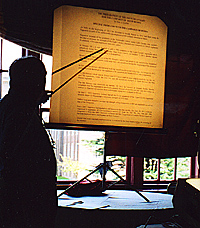 Most English language sources say Napoleon rejected the Allies' proposals for peace, but it was the double-dealing Austrian minister Metternich who played a deadly game of delay and ultimatum that extended the war.
Most English language sources say Napoleon rejected the Allies' proposals for peace, but it was the double-dealing Austrian minister Metternich who played a deadly game of delay and ultimatum that extended the war.
Jean wields his trusty pointer to highlight a particular point.
After the debacle of 1812, Prussia had declared war in March 1813 while Austria received an armistice from Russia in 1812 and was neutral in early 1813. When Prussia declared war, the "War Party" in Austria received a boost and Austria started to negotiate with Prussia and Russia.
Napoleon meanwhile hurriedly rebuilt his forces and staged a remarkable comeback with twin victories of Lutzen and Bautzen in 1813. At that time, an armistice was called on June 2. Both sides needed the armistice to re-organize, and Napleon worked to increase his cavalry (the lack of which cost him a decisive victory at Bautzen). Napoleon's victories quieted the Austrian war faction.
Napoleon offered Austria provinces lost in 1809 if Austria would remain loyal to France. Metternich professed loyalty, but negotiated behind the scenes to unseat the French. Metternich pushed for the return of France to its original borders, return of provinces, and turning Holland into an independent nation.
Napoleon wanted the House of Braganca to rule Portugal, Kingdom of Naples to be under Murat, Spain under Joseph, British to Sicily, Russia pull back to 1812 borders, and the 1807 Tilsit Treaty to remain intact. However, he was willing to compromise on some points, including dissolving the Confederation of the Rhine and turning the Duchy of Warsaw back over to the Russians and Prussians.
Timing 1813
June 2: Armistice declared.
June 15: Britain provides 2 million pounds sterling to Russia and Prussia to continue the war. Also offers Austria 600,000 pounds sterling to enter the war.
July 7: Metternich and Napoleon meet to discuss peace terms.
July 10: Peace Conference opens in Prague, armistice extended to August 10. The Negotiations proved to be nothing but a farce.
July 30: Metternich decides privately to go to war, and announces that the armistice will not extend past August 10.
August 5: Napoleon says "it will take at least 40 days to negotiate."
August 7: Metternich assures French minister Calaincourt that Austria is not with Prussia and Russia, but Napoleon must accept the Austrian ultimatum by August 10 or it will be war. Furthermore, Metternich says that any counteroffer received after August 10 is unacceptable.
August 9: Napoleon, in Paris, receives Calaincourt's report. To reply, even to agree, must be immediate. There is no time and no negotiation from the original conditions.
August 10: At midnight, Austria, Russia, and Prussia agree to their own terms.
August 12: Austria declares war against France.
August 17: Hostilities officially resume.
Summary
Metternich deliberately misled the French during the negotiations and furthered the path towards war by placing time restrictions on the negotiations. That there were no real negotiations was apparent with the ultimatum, even though Napoleon had seriously considered accepting many of the conditions.
On the other hand, who could blame Austria for wanting to take advantage of Napoleon's weakened state? The country had lost so many times that it was, in effect, a French satellite country, not a strong nation under its own monarchy.
More Borodino 2002 Napoleonic Conference
- Welcome, Introduction, and the Hotel Chamberlain
Borodino Ballroom
MagWeb.com Napoleonic Speakers Conference
Friday Lecture: Bob Coggins: Napoleonic Unit Frontages and True Linear Scale
Friday Lecture: Frank Chadwick: The Russian Army at Borodino
Friday Lecture: Jean Lochet: Preparation of French Cavalry for Campaign of 1812
Friday Tour: Fort Monroe Casemate Museum
Friday Keynote Lecture: Dr. William J. Gregor: Long Shadow of Napoleon on American Military Planning
Friday Lecture: Jean Lochet: The Attempt to Rebuild the French Cavalry for 1813
Saturday Lecture: Kevin Zucker: The French Army of 1812
Saturday Lecture: Dr. James H. Birdseye: Glory or Shame? The Role of Morale on the Napleonic Battlefield
Saturday Lecture: Dr. George Nafziger: Prelude to 1812: The 1809 Campaign in Poland
Special Guest: Lt. Col. Andrey Pavlov: Deputy Military Attache from the Russian Embassy
Saturday Lecture: Glenn Drover: Napoleonic Game Design and Production
Saturday Lecture: Jean Lochet: The Peace Conference of Prague: Negotiations with Napoleon During the 1813 Armistice
Video Presentation: Dr. Ben Weider: Borodino Re-enactment 1997
Video Presentation: Austerlitz and Sharpe
Re-enactor Presentations: Russians and French
Borodino: The Wargame
Side Wargames: Survivor, et al.
Awards Banquet
Back to List of Conventions
Back to Travel Master List
Back to MagWeb Master List of Magazines
© Copyright 2002 by Coalition Web, Inc.
This article appears in MagWeb (Magazine Web) on the Internet World Wide Web.
Other military history articles and gaming articles are available at http://www.magweb.com